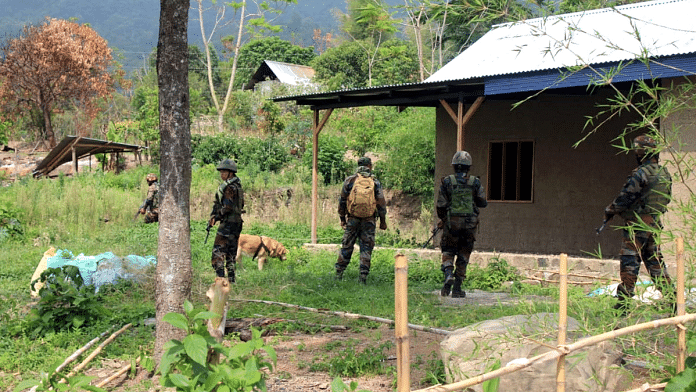Amid the wide circulation of distressing videos depicting the sexual assault and harassment of Kuki community women from Manipur and the subsequent national outcry, India has finally begun to acknowledge the entrenched ethnic conflict that has engulfed the Northeast state since May. While numerous op-eds and news reports have shed light on the brutalities between the two major factions, the Kukis and the Meiteis, the violence is underpinned by complexities and subtleties that transcend the sensationalised media portrayals.
The Manipur conflict is not a spontaneous eruption of hostility between two ethnic groups; rather, it is a manifestation of deep-seated structural and institutional issues that have long afflicted the state. Beyond ethnic tensions and territorial disputes, institutional arrangements, land conflicts, historical grievances, resource competition, and ineffective governance structures have all contributed to years of enmity between these two communities, culminating in the present-day violence. Hence, a thorough evaluation of the developments in Manipur over the past three months has become imperative.
As a starting point for this assessment, attention must be turned to the unregulated internet shutdown in Manipur that persisted for more than 80 days, arguably causing more harm than good. While internet bans are implemented with the intention of curbing violence, hate speech, misinformation, or unrest, they can inadvertently cut off crucial information from reaching the public, as witnessed in Manipur.
Internet bans hindered the revelation of on-ground injustices to the national consciousness, denying many victims timely support and assistance from the appropriate authorities. This highlights that internet bans should not become a routine and unchecked practice, but should be utilised only in exceptional circumstances to prevent the rapid dissemination of false information that might otherwise escalate into violent clashes. Restricting internet access temporarily can be a useful crisis and conflict management measure, but only with an effective review mechanism in place. Policymakers must reevaluate the Information Technology Act of 2000 and the Telegraph Act of 1885 to strike a balance between preserving public safety and upholding fundamental rights. Measures should be devised to tackle the misuse of digital platforms and to control the further incitement of violence. Moreover, such bans should only be employed as a last resort, ensuring strict safeguards for the protection of citizens’ rights and well-being.
Also read: Why Assam Rifles’ vilification is a calculated, conniving move for revenge
No time to ignore
Another critical concern is that conflicts disproportionately affect vulnerable sections of society, such as women, children, and disabled individuals. As seen in Manipur and globally, sexual violence against women and girls is rampant in conflict zones, where targeted violence serves as a tactic to demoralise, humiliate, and instil fear in the enemy population. As such, effective accountability mechanisms are needed to address conflict-related sexual violence, coupled with timely data collection on such acts. The deficiencies in safeguarding women are also evident in institutional setups that often fail to protect the vulnerable, despite being designed for that purpose. These inadequacies are most clearly visible in government-established relief camps—lack of menstrual hygiene products and medications, inaccessible infrastructure, inadequately trained medical personnel, limited access to reproductive healthcare and safe breastfeeding spaces, and frequent incidents of sexual assault and harassment are just a few instances of the numerous unspeakable horrors endured by women.
Similarly, in Manipur, during this grave moment of crisis, the fundamental needs and concerns of women and children have either been ignored or inadequately addressed, resulting in tragedies such as the death of a pregnant tribal woman and her unborn child after being denied admission to five hospitals. This underscores the lack of specific laws addressing the rehabilitation of internally displaced persons resulting from political conflicts in the country, leading to significant ambiguity in relief and rehabilitation. Therefore, new policies are necessary to address this issue effectively.
Furthermore, the state has witnessed complete inaction or undue delays in decision-making by the government, exacerbating a sense of abandonment and helplessness among those affected. Autonomous news sites run by NGOs, student-led associations, and independent organisations across Manipur have highlighted cases of abductions, rape, sexual harassment, and even murder of women in the state. A grim example is the incident of a woman shot dead right outside a school on the day educational institutions reopened in the state. Two more Kuki women endured the horrors of rape and murder in Imphal. Despite their families promptly filing FIRs, it took over two months for the authorities to initiate action. Horrifyingly, their bodies remain in the mortuary, with their families unable to perform the sacred rites of passage. The delayed response from authorities raises concerns about numerous other untold atrocities hidden from the world, reflecting a failure to protect and seek justice for women facing violence.
The situation in Manipur demands urgent and comprehensive action to address deeply rooted structural and institutional violence. Acknowledging the historical grievances of both communities and establishing platforms for open dialogue, where all voices are heard and respected, is essential for dismantling systemic violence. The government should actively foster an environment of mutual understanding, acknowledging past injustices, and promoting equitable representation in decision-making processes. By addressing the root causes of systemic violence and actively working towards negotiations and reconciliation, Manipur can forge a path toward a more peaceful and harmonious future for all its communities.
The situation in Manipur requires compassionate and equitable handling, free from partisanship or sectarian considerations. Decisive, firm, and fair action would help bridge the trust deficit in the government’s leadership, both at the central and state levels.
Pradyut Bordoloi is a Lok Sabha MP from Nagaon, Assam and convenor of the North East Congress Committee. Madhulina Sonowal is a research intern and a current undergraduate student at Lady Shri Ram College, Delhi. Views are personal.
(Edited by Prashant)



